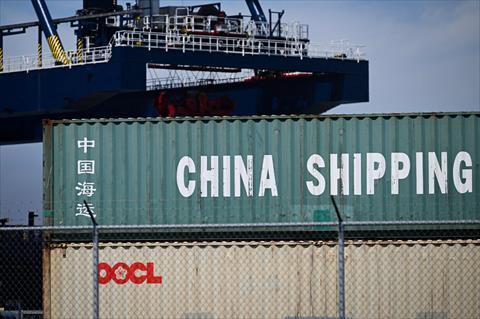You are here
China lifts tariffs on US goods to 125% as trade war escalates
By AFP - Apr 11,2025 - Last updated at Apr 11,2025

A China Shipping cargo container sits stacked at the Port of Long Beach in Long Beach, California on April 10, 2025 (AFP photo)
Beijing — China said Friday it would raise its tariffs on US goods to 125 per cent in a further escalation of a trade war that threatens to bring exports to a halt between the world's two biggest economies.
Beijing's retaliation sparked fresh market volatility, with European stocks seesawing following the announcement while Tokyo and Seoul closed in the red.
In a sign of investors' worries about the health of the US economy under President Trump's erratic stewardship, the dollar fell to a three-year low against the euro and by 1.3 per cent against the yen.
In Beijing, China's State Council Tariff Commission said new tariffs of 125 per cent on US goods would take effect Saturday, almost matching the staggering 145 percent level imposed on Chinese goods coming into America.
A Commerce Ministry spokesperson said the United States bore "full responsibility for this", deriding Trump's tariffs as a "numbers game" that "will become a joke".
The Chinese finance ministry said tariffs would not go any higher because "there is no possibility of market acceptance for US goods exported to China" -- an acknowledgement that almost no imports are possible at the new level.
Beijing also said it would file a lawsuit with the World Trade Organization over the latest round of levies announced by Trump.
Chinese President Xi Jinping condemned "unilateral bullying".
While the superpowers clash, the EU said its trade chief Maros Sefcovic would hold talks with US counterparts in Washington on Monday to resolve their own tariffs spat.
Sefcovic is travelling "in good faith to try and find solutions that can benefit us all," EU trade spokesperson Olof Gill said.
‘Beautiful thing'
Trump sent global financial markets into a tailspin by announcing historic tariffs on America's trading partners on April 2, including a 10-per cent baseline for all goods coming into the United States.
After days of plunging markets, on Wednesday he froze the higher tariff rates of 20 percent or more imposed on allies such as the European Union or Japan, but kept an additional rate of 34 per cent on China.
Beijing has since retaliated, leading to tit-for-tat increases over the past few days that culminated in Friday's latest move.
Trump acknowledged "a transition cost and transition problems" on Thursday, while insisting "in the end it's going to be a beautiful thing."
Speaking to reporters, he said he had respect for Xi and was hoping for a deal.
"He's been a friend of mine for a long period of time. I think that we'll end up working out something that's very good for both countries," he said.
Economists warn that the disruption in trade between the tightly integrated US and Chinese economies threatens businesses, will increase prices for consumers, and could cause a global recession.
Trump described the European Union as "very smart" to refrain from retaliatory levies.
But the 27-nation bloc's chief Ursula von der Leyen told the Financial Times on Friday that it remained armed with a "wide range of countermeasures" if negotiations with Trump hit the skids.
"An example is you could put a levy on the advertising revenues of digital services" applying across the bloc, she said.
European response
During talks with Spain's Prime Minister Pedro Sanchez on Friday, state media quoted Xi as saying Friday that China and the EU should team up on trade.
"China and Europe should fulfil their international responsibilities... and jointly resist unilateral bullying practices," Xi said.
This, he stressed, would not only "safeguard their own legitimate rights and interests, but also... safeguard international fairness and justice."
Top EU officials are due to hold their next summit in July.
After new falls on Wall Street on Thursday, Asian markets were under pressure again on Friday.
Tokyo sank three percent -- a day after surging more than nine percent -- while Sydney, Seoul, Singapore and others also sagged.
European markets opened higher only to fall after China's retaliation, but they pared down losses later.
Gold, a haven in times of uncertainty, hit a new record above $3,200 while investors spooked by Trump's policies dumped normally rock-solid US Treasuries.
"The sugar high from Trump's tariff pause is fading fast," said Stephen Innes at SPI Asset Management.
"Bottom line: the world's two largest economies are in a full-blown trade war -- and there are no winners."
But US Commerce Secretary Howard Lutnick boasted on social media Thursday that "the Golden Age is coming. We are committed to protecting our interests, engaging in global negotiations and exploding our economy."















